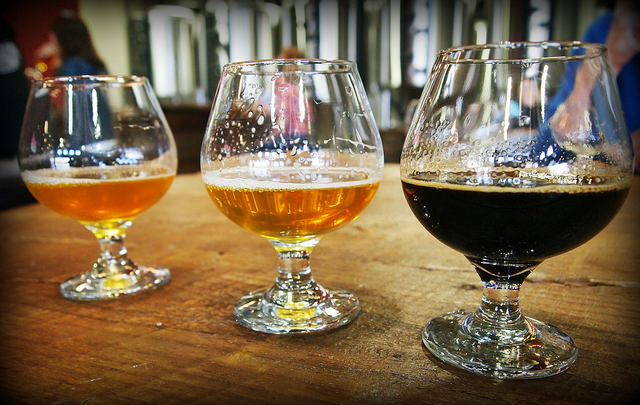Local craft beer is hot and can be a big boost to restaurant guest checks.
But like any farm product, beer can come with a real environmental cost. It can take up to 20 gallons of water to make a pint of beer, once you’ve accounted for grain, hops and brewing, a Wall Street Journal article notes.
As the $55 billion-a-year craft beer industry expands, many enterprising breweries are working hard to cut their resource use and boost their sustainability efforts. The rallying cry for some: Save the Earth! It’s the only one with beer.
The craft-beer industry’s sustainability efforts were on display at the recent 2016 Craft Brewers Conference in Philadelphia, which brought together 10,000 craft-brewing professionals from packaging breweries and brewpubs to share ideas and best practices. Sustainability was a key topic at this year’s event.
Looking for ways to promote your restaurant’s sustainability efforts? Consider partnering with your brewers. Here are five ideas for restaurants on how to do it.
Sourcing sustainable ingredients for each pint
Beer requires four ingredients: water, malted barley, yeast and hops. Lighten the environmental impact of any one of these and you can produce a more environmentally friendly beer.
Chilton, Wis.-based Briess Malt & Ingredients Co. launched a “Green with Briess” program 11 years ago and now recycles 99% of its waste stream to feed cattle and generate power. The company reduced energy and water use by up to 20% in many of its facilities.
Salmon-Safe is a farm-certification that certifies a number of hops growers in the Pacific Northwest, the source of most US hops. The company encourages brewers nationwide to use Salmon-Safe hops to craft their beer and help protect the salmon population in these key watersheds.
Restaurant takeaway: Ask your local brewers how they source their ingredients. Let them know their sourcing is important to your restaurant business.
Clean water is king
You can’t make beer without water — and you can’t make good beer without clean water.
As the craft beer industry gets in the queue for water resources, brewers are getting involved in issues related to the water supply. Bent Paddle Brewing Company in Duluth, Minn., for example, helps lead a coalition to protect water from mining-related contamination upstream. Breweries out West are dealing with water-access problems due to the severe drought. US Environmental Protection Agency representatives were on hand at the conference to openly discuss many of these issues and hear directly from brewers about the water resource challenges they are facing
Restaurant takeaway: Ask your brewers what steps they are taking to reuse water in their operations and how they’re working to promote clean water resources for everyone.
Ground-up, eco-design for breweries
As brewers continue to build, grow and expand, they’re looking at the sustainability of their buildings. Leaders from three breweries talked at one conference session about green-building design and employee practices at their facilities. Three ideas: Use skylights instead of traditional lighting, reclaim used building materials and purchase renewable energy.
In addition to building-design tips, the Brewers Association offers other resources, including guides to help beer makers reduce and treat water and waste water, reduce solid waste and cut energy use.
Restaurant takeaway: Many breweries and brewpubs are implementing innovative eco-changes. Find out what your local brewers are doing. You may even want to adopt some of their efforts yourself.
Taking brewpub sustainability seriously
Brewpubs are basically restaurants that brew beer in the back, and share the same interests as any other restaurant when it comes to sustainability in the front-of-the-house and kitchen. I presented brewpub owners with nine ways to cut energy and water use during my Brewpub Sustainability session, Don’t Leave Money on the Table: Not-so-secret Eco-steps to Make Your Brewpub More Sustainable. Two other panelists, Seth Gross from Bull City Burger and Brewery in Durham, N.C., and Kris Spaulding of Brewery Vivant, Grand Rapids, Mich., offered great suggestions on team-building to leverage sustainability efforts. Philadelphia’s newly opened Saint Benjamin brewpub was cited as a great example for its efforts to divert its food waste for composting.
Restaurant takeaway: Join forces with local brewpubs and other restaurateurs to collectively tell a great sustainability story about the industry’s efforts to conserve.
Brewing eco-beer from the ground up
Ten environmentally-focused breweries from across the country joined together at the conference for a party to debut their Brew the Change beer. The beer was the result of a collaborative eco-brewing effort and was launched with the help of sustainability-focused ingredient suppliers, including The African Bronze Honey Project and a Salmon-Safe certified hop farm. The 10 companies are certified as “B Corps” — a designation from the nonprofit B Lab for companies that meet certain standards for social and environmental performance, accountability and transparency.
Restaurant takeaway: Ask your local brewers about teaming up to produce a limited-run eco-beer. Throw a party to raise awareness (and profits) around local sustainability efforts in your city. Consider donating a portion of the proceeds to a local charity.
__________________________________________________
If you enjoyed this article, join SmartBrief’s email list for more stories about the food and beverage industry. We offer 14 newsletters covering the industry from restaurants to food manufacturing.
